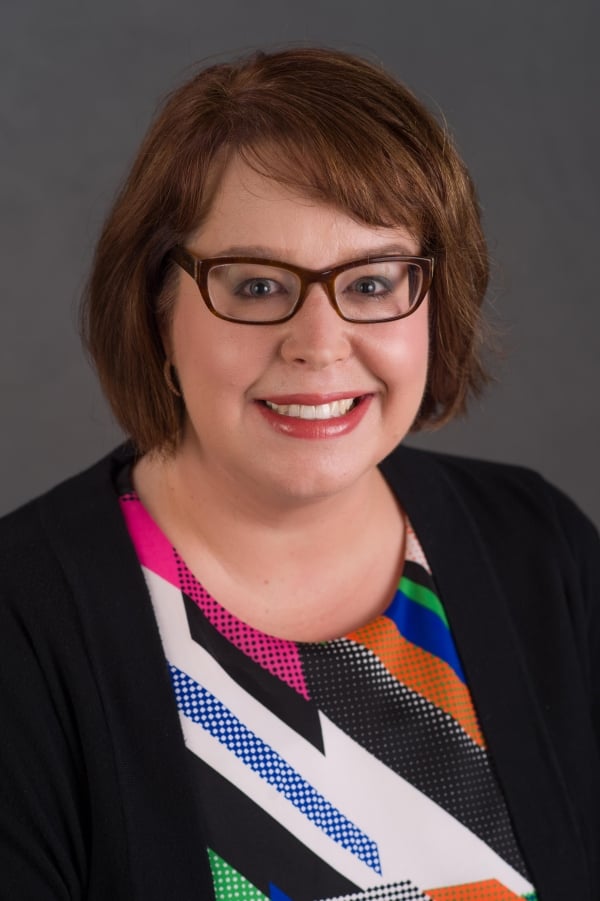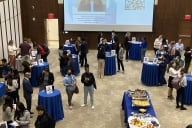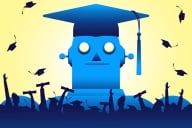You have /5 articles left.
Sign up for a free account or log in.

Purdue Global offers career advancement opportunities for online learners.
DisobeyArt/iStock/Getty Images Plus
Adult learners are a growing population in higher education, but how colleges and universities serve post-traditional students looks different from best practices for their traditional-aged peers, as many hold additional responsibilities such as caregiving or full-time work.

Jennifer Lasater, vice president of student and career advancement at Purdue Global
Jennifer Lasater/Purdue Global University
Purdue Global, Purdue University’s online arm, mainly serves adult learners, helping students complete a degree or credential and start their next career chapter. The Center for Career Advancement, led by Jennifer Lasater, vice president of student and career advancement, works to equitably reach students with career touch points throughout their time at the university, considering their career interests, geographic region and vocational goals.
Lasater spoke with Inside Higher Ed about her work as a career service professional, the differences in serving adult online learners and her definition of student success.
Q: What is your role at Purdue Global? What’s in your purview?
A: I have a couple of different hats … I lead and inspire and help all of our students through the work of our Center for Career Advancement. We have teams that are centralized, but organized by school, and they work with our students to help them on the next step in their career.
Our students that come to us at Purdue Global are adult learners. They know that this next step in their educational journey should help them in their career journey as well. We do a lot of one-on-one coaching and support and even some shared accountability, where we’ll say, “OK, we found five leads for you this week—what have you done this week?” Really building a partnership with that student, that graduate, along the way.
We have a team of about 50 in the Center for Career Advancement—which is a big team when you look at things nationally by the numbers.
I also manage … the student success team. We’ve got about 25 people who work with students throughout their educational journey on anything from helping with time management, support, basic needs support, organizational support—whatever a student needs help with. They’re there to help them build a success plan so that they can continue with going to school and work towards that goal of graduation and that better job.
Then I also help on the Federal Work-Study side. We are involved when it comes to helping identify places that students could get work-related Federal Work-Study so that they’re gaining experience and adding to their résumé. Everything that we do inside a Federal Work-Study relates back to the program of study. We want to build in that piece where they’re getting the great experience through Federal Work-Study, but it’s also applicable for their résumé and they can talk about that experience with an employer and [in] an interview.
And then lastly, I also help with some new program development. I’m a bit of a data geek; I love looking at the labor market. And so I look a lot at data through Lightcast and look at labor market data and look at, OK, what skills does someone need to take the next step in their career? What areas in the labor market need new credentials? So we work really closely on looking at that and spinning up new programs of study, where we can take somebody’s skill set, add to it and then help them advance in their career. It’s a really fulfilling job. I love what I do, love working for Purdue Global.
On the side, I also got very involved in NACE, the National Association of Colleges and Employers. And I was involved with them for the last 14 years. I’ve been a past president and still continue to volunteer and help with them.
Q: With Federal Work-Study, I think most people think of that as an on-campus job. But at Purdue Global, that obviously looks a little different. How does that work practically?
A: We do both on-campus and off-campus.
Internally, if we have a department that wants help, we have them share with us the goals of that [role], and make sure it’s going to relate back to the program of study. Same thing with our nonprofit partners; we do work with [K-12] schools, all the reading and tutoring programs that are out there, we are involved in as well. But then we also look specifically for nonprofits that have the opportunity to build that résumé experience.
So as an example, we work with a group called Crisis Text Line, they’re national, and a lot of our students in our psychology programs that are Federal Work-Study–eligible can work for Crisis Text Line and get some great practical experience … especially if they’re a career changer.
Q: You mentioned career changes. That’s a priority for many adults who return to higher education. How does that influence career-development conversations at Purdue Global and what does that mean for you as a career service professional?
A: It’s funny, because the name changes no matter what university you go to—a lot of people say career services, career development. For us, we have the Center for Career Advancement. From the very beginning, the idea of advancement is front and center. We’re taking you from one place to the next, maybe it’s a promotion with the company you’re at, maybe it’s a whole new career change. Maybe you don’t know what you want, but you need something and you know that you’re here to get it.
I think it is so vitally important that career services is immersed into the student experience and it’s not something that happens to someone as they graduate. Because then there’s a lot of regrets. And there’s people who say, “Oh, gosh, I wish I would have known to join a professional organization, or build my LinkedIn profile earlier, or get involved in Federal Work-Study” or intern, extern, whatever.
So we built career-related touch points throughout a program of study, so we work very closely with our deans and faculty and curriculum developers. We go into classes—typically we’re identifying mandatory classes in a program of study at the 100-level, 200-level, and then at the capstone level, so they’re seeing us throughout the journey—and we’re talking about topics that should be relevant to them as they’re in that class. There are major-specific [courses] as well. We’re talking about what’s in the industry, and we’re also giving them the important things of “OK, now’s the time you really need to learn about networking. Let’s talk about networking.”
In the second touch point, we might hit on LinkedIn profiles and how you build one—because we never want to assume everybody knows everything, and we don’t want to assume people know nothing, either. It’s finding that balance.
We also bring employers in … to what we call an employer spotlight. An employer joins us for 45 minutes to an hour online, no cost. We promote it with our students; we also ask that we can record it, so then we have a library of these. So when a student says, “Hey, I have an interview with AT&T next week,” we can say, “Oh, we have a recording from them. They just did [an employer spotlight] two weeks ago—you should watch this ahead of time.” We host those quite a bit for every program of study … I really think it’s important, especially with adult learners, that you have career services tools available 24-7.
We also, years ago, built our own internal career site, where there’s a river of questions and answers. Basically, a student can ask a question anytime in the day and we’re staffed from 8 [a.m.] to 8 [p.m.] to answer those questions. We have staff who are on, we call it portal duty. They’re doing their everyday duties, but they’re keeping an eye on the questions as well.
When we answer a question, we don’t answer it saying, “That’s a great question, Jimmy, let’s meet on Thursday and talk about it.” We answer for the lurkers. We answer for the people who are too afraid to ask a question. So we write out, “OK, you’ve got an interview tomorrow. What do you want to wear? Let’s talk about it.” And so we’ll go through, like, “OK, your industry, it’s more appropriate to wear this and this and this.”
We’ve learned over time that students support each other in this community as well. We had, a while back, a student say, “Hey, I just moved to Ohio, and I’m looking for a job at a hospital. Does anybody have any good feedback?” and we had a student who said, “Yeah, I work at XYZ Hospital, and here’s the name of the HR person, and you should talk to them.” So it’s building that community of support as well, not only from the staff, [but] from the students who are learning and encouraging each other.
Our job feed, which is a little different than most schools’, is powered by Lightcast. With adult learners, I have anybody who is maybe working a part-time job at McDonald’s, all the way up to people in the C-suite … They have a variety of different experiences and learning throughout their time. So we partner with Lightcast to go out and scrape jobs off of all of our partners’ as well as professional organizations’ different job feeds out there.
Because for me, the volume of jobs and the variety of jobs is so important. There’s no assumption that everybody graduating from our school is 22 years old and getting their first full-time job … And it’s tailored toward a student’s program of study and their geographic area, so they can see what employers are in their community. But then they can also say, “Well, I’ve always wanted to move to New York,” so then they can change it and look for jobs in New York, if they’re interested, as well.
While they’re job searching, as a pending graduate, they’re meeting with their career specialists—typically once every other week—talking about leads, talking about interviews, talking about how they’re searching. It’s a collaborative experience, where you’ve got somebody in your corner, and they’re also going to hold you a little bit accountable in case maybe you blew up an interview, you shouldn’t do that. “Let’s talk about that. Why did you do it? What can you do to change that?” We want to be there every step of the way.
Typically we do that about three terms before graduation, we start those conversations. So it’s usually about 30 weeks, half a year before they’re graduating, that we’re starting those conversations and tailoring it to their needs. Maybe they’re a nursing student, [and] they don’t want to look until they pass their boards—“OK. Let’s set up a time. When are you going to take your boards? Let’s reconnect after you take them.” Other people might say, “Let’s start now.” So we make sure we customize it depending on their needs.
Q: You mentioned geography. The average adult learners are more place-bound than the average traditional-aged graduate. How does that affect your work and how you’re finding employer partners?
A: When we organize the team, we’re organized by school, but then we also look at program of study and then geography, because you can’t know every employer across the country.
Let’s say we have a program like nursing. You might have a cohort assignment where you’re working with students in a bachelor’s degree in nursing, maybe in the Northeast. Typically a cohort for one of our career specialists is anywhere from 250 to 300 graduates in a year. So we might have easily 300 graduates in the Northeast, and it’s a pocket of about five or six states. But then we have other programs where it might be fire science, and maybe we don’t have as many [students]. So then you might cover fire science nationally.
We go by the school first, the program—depending on the degree level, if we have a difference, you might only do bachelor’s, you might only do master’s—and then geography.
When we work with employers, we have team leads on the team who are career specialists … one of those team leads’ roles is to build national partnerships with employers throughout the country. When you’re doing the one-on-one support and coaching, you’re focused more on the local geography of your graduates in that area. But then we have people who also help with the national. Like the AT&Ts, the Disneys, we’ll have a team lead reach out and talk to them, build those employer relationships and then get granular as we need to.
But then people are doing their one-on-one searches, and maybe they want to look for nursing jobs in Boston. The career specialist is working directly with that student and looking at labor market data again, from Lightcast, where we can say, “OK, who’s hiring the most in this area? Let’s reach out and build a relationship with HR at this place, so that we can start getting more and more of our students hired there because they have a need.”
Everybody’s got their own story, so I think it’s really important that people find their wins throughout the way. A lot of people get sick of me saying this, but I think it’s so vitally important that we show how many successes they are, instead of picking, like the best five … Sometimes it might serve as being uninspiring.”
Q: What’s your definition of student success?
A: Everybody’s got their own story, so I think it’s really important that people find their wins throughout the way.
A lot of people get sick of me saying this, but I think it’s so vitally important that we show how many successes they are, instead of picking, like, the best five. My joke is someone raised by wolves and walked to class every day with 50-pound weights on their back and started a nonprofit where they were at school, and those people are amazing, and that’s great. But some people might feel like, “That’s not me—I have so many other things going on in my life. I can’t do that.” Sometimes it might serve as being uninspiring.
So for me, it’s all about the everyday wins. One thing I’ve always wanted to do—one day, we’re gonna get it done. On our career site, we [would] almost have a ticker, like the stock market, where we just say, “Jamie got a new job”; “Jimmy’s interviewing for this role.” Not identifying anybody personally, but showing the value of all the great work that’s going on.
Really, that personal relationship with the career specialist and the student—or the student success coach and the student or the Federal Work-Study specialist in the student—that’s helping them identify what their wins is going to be. What’s that next step? Maybe for somebody it’s a promotion, it’s a career change. We don’t want to make assumptions on what is success for our students. We want them to have a hand in what they’re saying their successes are and help us know where their goal is at so that we can help them get there.
There are some really compelling stories that come out of a lot of different places, which are wonderful. But I also think you have to celebrate those everyday wins as well, because it makes a big difference for that student and their family. And that also set you know, especially for first-gen students, that sets up an expectation in the family: “I did it; you can do it, too.”
Seeking stories from campus leaders, faculty members and staff for our Student Success focus. Share here.








